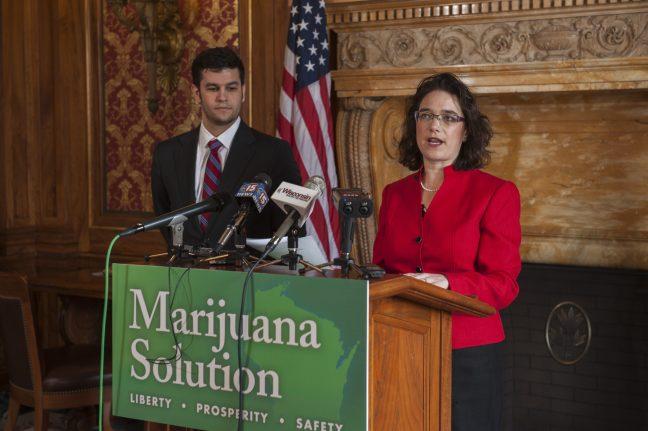With a majority of Wisconsinites supporting marijuana legalization and newly elected Gov. Tony Evers supporting it, Rep. Melissa Sargent, D-Madison, introduced a bill Thursday to fully legalize it in Wisconsin.
Sargent has introduced legislation to legalize marijuana three times before. Her latest attempt would legalize the manufacture, distribution, delivery, possession and use of both recreational and medicinal marijuana. It also proposes a process for the expungement of criminal records for those with marijuana offenses and the repeal or reduction of sentences for those incarcerated for “non-violent, minor” marijuana-related crimes.
“Far too many lives and communities have been damaged by out of date and backwards cannabis policies, and we must take this important and necessary step towards rectifying these damages,” Sargent said in a press release. “The simple truth is, the most dangerous thing about marijuana in Wisconsin is that it is illegal.”
Ten states and Washington, D.C. have legalized cannabis for adult recreational use and 33 states have medical cannabis laws. At a press conference announcing the legislation, Sargent said Wisconsin is an “island of prohibition in the Midwest.” Wisconsin would join its neighbors to the west, east and south — Minnesota, Michigan, and Illinois, respectively — in legalizing at least one form of marijuana.
A majority of registered Wisconsin voters believe marijuana should be legalized. In a January Marquette Law School Poll, 59 percent of respondents said marijuana should be legalized. In September 2014, only 46 percent supported legalization.
Across 16 counties and two cities, nearly a million voters voted yes on non-binding referenda asking whether marijuana should be legal for medical or recreational use, according to the Wisconsin State Journal.
“With this momentous and growing support for full legalization, it is clear that the people are ready for truly pragmatic and common sense action,” Sargent said in a statement.
In 2018, cannabis grew to a $9 billion industry. Sargent said legalizing recreational marijuana would open the door to “countless family-sustaining jobs,” and taxing the plant would provide “abundant economic stimulus” for the state. Legalization would create an estimated $138 million in tax revenue and 18,000 jobs, Sargent said.
Under the bill, an agency charged with agriculture and consumer protection would oversee the industry, a feature unique to the bill that is unlike statutes in other states, Sargent said.
While growing the plant commercially would require going through a merit-based application process, an individual over the age of 21 would be able to cultivate six plants for personal use, a feature of other state regulations like Vermont. To possess recreational marijuana, an individual would have to be over the age of 21, but those with or undergoing treatment for a debilitating medical condition would be able to qualify to possess medicinal marijuana.
Those under the age of 18 would be able to possess medicinal marijuana with their legal guardian’s consent.
Evers has proposed legalizing medical marijuana in Wisconsin, decriminalizing the possession of small amounts of the drug and expunging charges stemming from possession, according to Wisconsin Watch. Lt. Gov. Mandela Barnes has also expressed support for legalizing medical marijuana.
Despite support from the governor’s office and fellow Democrats, Sargent’s latest push for legal marijuana might face a fate similar to her previous three attempts.
Republican leadership is opposed to legalizing marijuana. Speaker Robin Vos, R-Rochester, said he is “open to medical marijuana” if it is done in “targeted way” but is against Evers’ proposal. Similarly, Senate Majority Leader Scott Fitzgerald, R-Juneau, said he opposes legalization, claiming there is not enough support within the Republican-controlled Senate for movement on Evers’ proposals.
Since Sargent’s bill goes well beyond the scope of Evers’ proposal, which would only legalize medical marijuana through the state budget, it will likely not garner much support from her Republican colleagues.


